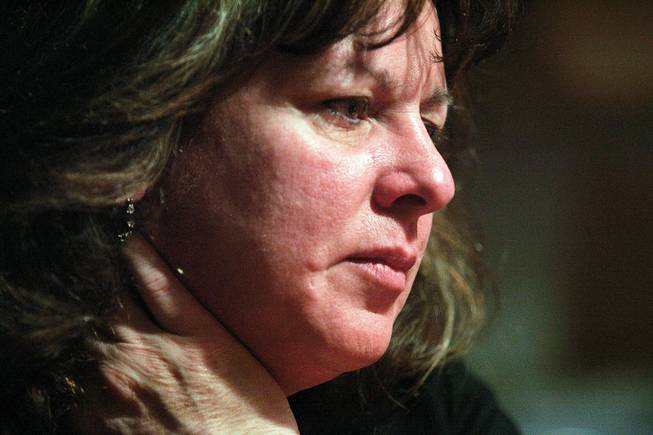
“Drugs and alcohol didn’t have anything to do with the real issue of why my brother was killed,” said Monique Cole, sister of ironworker killed at CityCenter.
Saturday, Aug. 9, 2008 | 2 a.m.
Sun Topics
Susan Englander’s husband, Harvey, never went out with the guys after work for drinks.
And he certainly wasn’t drunk or on drugs the day he died at CityCenter, when the manlift he was greasing came down on him.
So when Englander read in the Las Vegas Review-Journal on Thursday that several CityCenter construction workers had apparently been caught by reporters drinking before entering the job site, she worried: By insinuation, could the reputation of her husband and the other 11 workers who have died in the past 20 months at Strip construction sites be besmirched? Was the article suggesting they may have been intoxicated when they died?
“It just creates that doubt,” Englander said.
The Review-Journal reported Thursday that it had spotted 10 workers drinking at bars near CityCenter and then returning to work immediately after. Later that day, three of the workers identified — all ironworkers — were fired. CityCenter general contractor Perini Building Co. says it intends to identify and remove the rest of the workers spotted by the newspaper.
“It’s just very sad,” Englander said of the men’s drinking. “What were they thinking?”
The article suggested a possible connection between the observed drinking and the string of fatalities at CityCenter and other construction sites, where workers and union officials have alleged contractors are neglecting safety in the rush to finish massive, congested and complicated jobs.
The Review-Journal said it was not able to obtain toxicology reports for the fallen workers. The coroner’s office releases those reports only to authorized people.
Englander’s toxicology reports were one of five sets provided to the Sun this week by family members. Results of an additional screening were relayed to the Sun by a family member who was not at home with her records at the time. Families of the six other workers killed on the Strip could not be reached.
Of the six reports obtained, five — including Englander’s — came back clean. There were no signs of drugs or alcohol.
One worker, electrician Mark Wescoat, tested positive for traces of cocaine, a valium-like medication, a sleeping pill and a mild prescription pain medication. Wescoat died under mysterious circumstances in April when he fell two floors at CityCenter.
According to Dr. Mel Pohl, medical director of Las Vegas Recovery Center, the levels found in Wescoat’s system indicate he used each drug in the few days before his death. It is not possible from the results to determine whether Wescoat was under the influence of a substance when he died, Pohl said, or whether drugs played a role in his death.
Family members said Wescoat was given the prescription medications by a doctor. The insurance company denied his wife, Susan Wescoat, workers’ compensation death benefits. She insists her husband would not have gone to work under the influence of drugs.
The state’s Occupational Safety and Health Administration did not find any contractor safety violations in connection with Wescoat’s death.
In addition to Englander and Wescoat, the reports obtained by or described to the Sun covered Dustin Tarter, a crane oiler killed in May at CityCenter when he was crushed by a crane; David Rabun, an ironworker killed in November at the Cosmopolitan when the steel beam he was attached to fell down an elevator shaft; Harold Billingsley, an ironworker killed in October at CityCenter when he fell through a hole in steel decking; and Norvin Tsosie, an ironworker killed last August at Fontainebleau when the makeshift hook his safety harness was attached to failed.
Those workers all tested negative for drugs, the toxicology reports showed. Nevada OSHA reports indicate inspectors initially found that serious safety violations by contractors had contributed to the deaths, and did not indicate that drugs or alcohol had played a role in those deaths.
Nevada OSHA has not yet released results from the investigation into Tarter’s death.
The construction industry historically has had one of the highest rates of drug and alcohol abuse of any profession even as it is one of the most dangerous.
To combat that, Perini requires workers to take drug and alcohol tests when they begin the job, and it tests workers when there’s reasonable suspicion and when they’re involved in accidents. But workers who have been fired after testing positive say they were allowed to work for several days on the site before the test results became available.
Doug Mure, Perini’s vice president of human resources, said that procedure is standard for many industries.
“We haven’t drawn a conclusion that (alcohol and drug use) is a serious problem or not a serious problem, but any drug or alcohol use is a concern from the safety standpoint,” Mure said.
Some unions have also recently hardened their drug policies. The Ironworkers union that was highlighted in Thursday’s Review-Journal story had been planning to fully implement a random drug-testing system next year. A significant percentage of workers participate in the system, said Greg McClelland, a representative of the Ironworkers Labor Management Trust.
“It’s an effort to clean up the profession,” McClelland said.
Family members of Strip construction site victims welcome that. But they also want the record to be clear.
“Do I think drugs and alcohol in the industry are a problem?” said Harold Billingsley’s sister, Monique Cole. “Yes, I do, and they have been for years. But drugs and alcohol didn’t have anything to do with the real issue of why my brother was killed.”

Join the Discussion:
Check this out for a full explanation of our conversion to the LiveFyre commenting system and instructions on how to sign up for an account.
Full comments policy